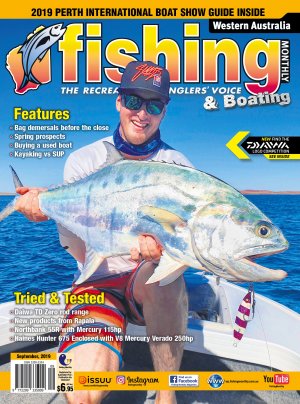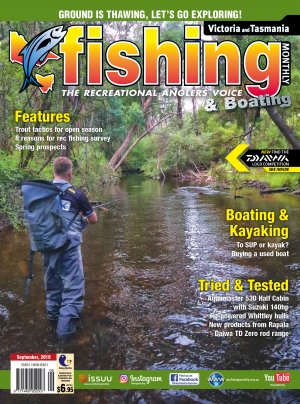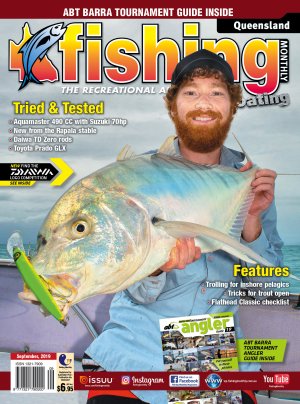It had been a long time coming but the Kampe clan finally bit the bullet and headed to Cape York last June to see what true tropical camping and fishing was all about.
The chosen destination was Weipa, the large camping grounds a handy base for forays to places such as Pennefather, Cloughs Landing, Mapoon and Stones Crossing, which had a magic sound to them and were perfect for some isolated camping and fishing.
It was a 2,600km trip from Brisbane’s southside to Weipa, with a 500km+ stretch of gravel road, the Peninsula Development Road (PDR), between the town of Laura and Weipa, with even more gravel out from Weipa. I’d heard much about the PDR, and fully understood that it was capable of being quite good, or quite bad, on any given day depending upon road works and the amount of traffic on a given week.
As we were taking the TABS 4.2 Bullshark punt – a brilliant decision and it will be going next time too – I’d upgraded the trailer considerably prior to departure with heavy duty rollers to support the keel; some extension of the longitudinal skids supporting the hull each side of the keel with shackle springs replacing the open-ended springs that came with the trailer, which might have caused problems on really rough road surfaces. Two spare tyres for the boat trailer were strapped to it , and a pair of spare hubs with greased bearings in each were carried within our tow vehicle, a Toyota Landcruiser.
Side covers for the boat were expertly made by Rowland Street Boat trimmers. With these in place not one stone marred the paint work. Brilliant!
The punt’s Evinrude power trim/tilt 25 E-Tec was also prepared for the journey. With the engine cowling removed the engine was treated to five continuous wrappings of extra wide Glad Wrap to keep dust out. With the cowling back in place another couple of wraps of plastic film were applied around the cowling and then taped in place. This treatment worked brilliantly as the engine was entirely dust free on arrival at Weipa, and then back home later.
As things transpired the trip was thankfully uneventful so far as vehicle issues were concerned. A cracked windscreen was the only casualty from the gravel road, courtesy of a driver who seemed to be trying to set some sort of land speed record for the journey.
Having seen the PDR first hand, it is the same as any other gravel road in the country: some parts are good while some are bad. The road is very wide and oncoming traffic can be seen a long way off. As an indicator of travel times we left Weipa on the return journey at 6am and were in Tully enjoying dinner at 8pm that night. Stops were only for fuel with a quick feed at Lakelands roadhouse.
Suggested overnight stops en route once past Ingham are at Palmer River roadhouse, which offers both accommodation and a meal, or nearby Lakelands roadhouse, renowned for scrumptious food and unbelievably good coffee.
From Lakelands it’s only a 20 minute drive to Laura where the gravel commences with stops at Musgrave roadhouse or Coen for fuel, Coen or Archer River Roadhouse for easy accommodation or a comfortable camp site. To stay at any of the PDR roadhouses I’d advise booking a long way in advance. A lot of people seem to have similar plans.
The only other comment I would make about the PDR is that it is definitely best travelled with a 4WD, and NOT at night. Too many dead cattle beasts, wild pigs and kangaroos litter the roadside for my comfort.
Our camp set up was based on rapid set up and pull down capability. It consisted of a 4.5m x 5m heavy-duty poly tarp amply supported by well spaced poles and a spreader bar with plenty of shade cloth on the ground below the fly. You cannot be assured of shade while camping at the Cape so a big fly is essential. Sufficient adjustable ropes and 50cm long sand pegs kept everything in place. Dome tents with full mesh all round to keep insects out, while allowing plenty of breeze through were ideal for sleeping in. Most days the temperature was in the high 20ºCs or low 30ºC, contrasting nicely with one Brisbane day of maximum 15ºC – Brrrrr!
Mosquitoes are a big factor during winter months; seldom present through the day but in hordes at and after nightfall. Our preferred method to keep them away was small smudge fires plus mosquito coils set around the camp, rather than continuous applications of repellent.
Refrigeration was courtesy of a Chescold RC1100 three way fridge freezer with gas the main power source. Lighting was amply provided by a three bar LED set from Korr Lighting, our stove a simple gas cartridge model. We also had a Weber cube along as well, with its gas cylinder a handy back up for the Chescold.
Supplementary power for topping up the various batteries, including powering the boat’s MinnKota Riptide iPilot, came via a set of Korr high output solar panels that worked brilliantly.
The refrigeration side of things worked perfectly. Our food and cold drinks were easily managed for our three person crew of myself, wife Denise and her son Steve.
The Chescold’s freezer compartment was set up to freeze water bottles (each night) to keep fish fillets fresh in a chiller bag aboard the boat. With no other ice source it was easy to fillet really good eaters such as mangrove jack, golden snapper or king threadfin salmon on a big cutting board then tuck the fillets into the chiller bag for later consumption. We ate barra too, but only when the other fish were not on the job.
If you are contemplating a trip to the Cape and have a boat my advice is to take it! Get it there somehow, even if it means a trailer upgrade or heavy-duty racks for the car. I’d had a previous trip to Weipa where Denise and I flew in and hired a 4WD and enjoyed reasonable fishing for plenty of queenies and the odd barra, however, our boat really opened the flood gates to fantastic fishing.
The 4.2 Bullshark was just the right size. Launching was never a problem as long as we could get at the water and we enjoyed top quality fishing that made every bit of that long drive worthwhile.
We did mostly day trips with two tote tanks of fuel aboard for the longer forays. Offshore we took endless tuna for sashimi, big Spanish mackerel, whopper trevally and prized reefies.
We went 15km offshore in the Gulf chasing reef fish, over 20km along the shore to a creek and then we went well up it to fish for barra, jacks and set crab pots. We also travelled 25km down the Wenlock River from Cloughs Landing to fish special barra snags we had local information on. And the barra were there!
I knew the Bullshark had a soft riding hull but travelling home at dusk on the Wenlock, three up, into near 1m high chop (steady wind against strong tide) really reinforced just how sweet riding the craft was. There was some spray about but we were not pounded one bit.
In summing up, I suggest that if you are contemplating a trip to the Cape plan for as many contingencies as possible and it should be fine. The mosquitoes are the only real down side for winter camping but they are manageable.
The sun is also a big factor but wearing adequate clothing, liberal sun screening plus a Buff will prevent damage to skin. Camping in designated aboriginal lands requires permits; enquiries best made at the Weipa camp grounds to obtain them.
Reads: 3131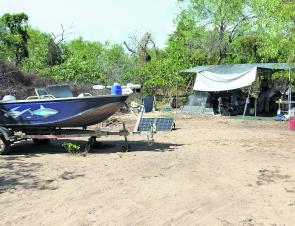
The Kampe camp. Ready to pack at short order but entirely adequate for the fine and dry climate of the Cape in winter.

Small dome tents with plenty of fine mesh kept the insects out but allowed breeze through for best comfort at night.
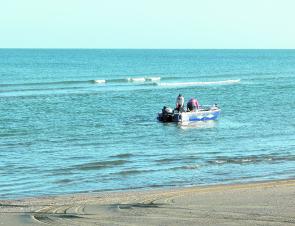
Steve and Scott prepare to go out in the Bullshark to collect some tuna for sashimi. If you have a boat work out a way of getting it to the Cape.
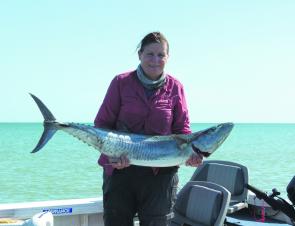
Denise Kampe with just one of the Spanish mackerel we took on our trip north.


